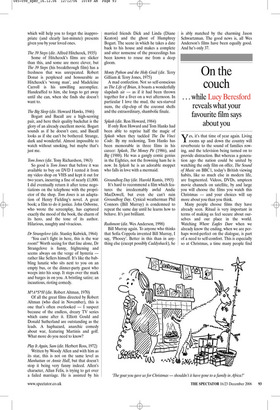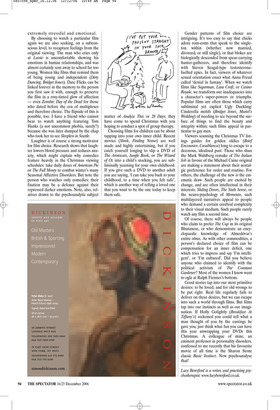On the couch
... while Lucy Beresford reveals what your favourite film says about you
Yes, it’s that time of year again. Living rooms up and down the country will reverberate to the sound of families rowing, and the television being turned on to provide distraction. But whereas a generation ago the nation could be united by watching the only film on offer, The Sound of Music on BBC1, today’s British viewing habits, like so much else in modern life, are fragmented. Videos, DVDs, umpteen movie channels on satellite, by and large you will choose the films you watch this Christmas — and your choices will say more about you than you think.
Many people choose films they have already seen. Ritual is very important in terms of making us feel secure about ourselves and our place in the world. Watching Where Eagles Dare when we already know the ending, when we are perhaps word-perfect on the dialogue, is part of a need to self-comfort. This is especially so at Christmas, a time many people find extremely stressful and emotional.
By choosing to watch a particular film again we are also seeking, on a subconscious level, to recapture feelings from the original viewing. The man who cries only at Lassie is uncomfortable showing his emotions in human relationships, and was almost certainly sent away to school far too young. Women like films that remind them of being young and independent (Dirty Dancing, Bridget Jones). Date Flicks can be linked forever in the memory to the person you first saw it with, enough to preserve the film in a rosy-tinted glow of affection — even Zombie: Day of the Dead for those who dated before the era of multiplexes and therefore choice. The flipside of this is possible, too. I have a friend who cannot bear to watch anything featuring Tom Hanks (a not uncommon phobia, surely?) because she was later dumped by the chap who took her to see Sleepless in Seattle.
Laughter is of course a strong motivator for film choice. Research shows that laughter lowers blood pressure and reduces anxiety, which might explain why comedies feature heavily in the Christmas viewing schedules: take daily doses of American Pie or The Full Monty to combat winter’s many Seasonal Affective Disorders. But note the person who watches only comedies: their fixation may be a defence against their repressed darker emotions. Note, also, relatives drawn to the psychoanalytic subject matter of Analyze This or 28 Days; they have come to spend Christmas with you hoping to conduct a spot of group therapy.
Choosing films for children can be about tapping into your own inner child. Recent movies (Shrek, Finding Nemo) are well made and highly entertaining, but if you catch yourself longing to slip a DVD of The Aristocats, Jungle Book, or The Wizard of Oz into a child’s stocking, you are subliminally yearning for your own childhood. If you give such a DVD to another adult you are saying, ‘I can take you back to your childhood, to a time when you felt safe’, which is another way of telling a loved one that you want to be the one today to keep them safe. Gender patterns of film choice are intriguing. It’s too easy to say that chicks adore rom-coms that speak to the singleton within (whether now married, divorced, or still single), or that blokes are biologically descended from spear-carrying hunter-gatherers, and therefore identify with Steven Seagal-type testosteronefuelled epics. In fact, viewers of whatever sexual orientation enact what Anna Freud called ‘denial in fantasy’. When we watch films like Superman, Lara Croft, or Casino Royale, we transform our inadequacies into a character’s super-powers or triumphs. Popular films are often those which carry subliminal yet explicit Ugly Duckling/ Cinderella motifs (Bridget Jones, Muriel’s Wedding) of needing to see beyond the surface of things to find the beauty and integrity within; such films appeal in particular to gay men.
Viewers scanning the Christmas TV listings guides for golden oldies (Brief Encounter, Casablanca) long to escape to a decorous, idealised past. Those who shun the Mark Wahlberg remake of The Italian Job in favour of the Michael Caine original are making a statement about their nostalgic preference for order and routine. For others, the challenge of the new is the cinematic draw. Such people are excited by change, and are often intellectual in their interests. Sliding Doors, The Sixth Sense, or the neuro-psychology of Memento, such multilayered narratives appeal to people who demand a certain cerebral complexity to their visual medium. Such people rarely watch any film a second time.
Of course, there will always be people who claim to prefer The Cup in its original Bhutanese, or who demonstrate an encyclopaedic knowledge of Almodóvar’s entire obras. As with other commodities, a person’s declared choice of film can be compensation for an inner deficit, one which tries to impress and say ‘I’m intelligent’, or ‘I’m cultured’. Did you believe anyone who claimed to identify with the political activism of The Constant Gardener? Most of the women I know went to ogle at Ralph Fiennes’s bottom.
Good stories tap into our most primitive desires: to be loved, and for old wrongs to be put right. Real life regularly fails to deliver on these desires, but we can escape into such a world through films. But films tap into our instincts as well as our imagination. If Holly Golightly (Breakfast At Tiffany’s) reckoned you could tell what a man thought of you by the earrings he gave you, just think what fun you can have this year unwrapping your DVDs this Christmas. A colleague of mine, an eminent professor in personality disorders, confessed to me recently that his favourite movie of all time is the Sharon Stone classic Basic Instinct. Now psychoanalyse that!







































































































































 Previous page
Previous page